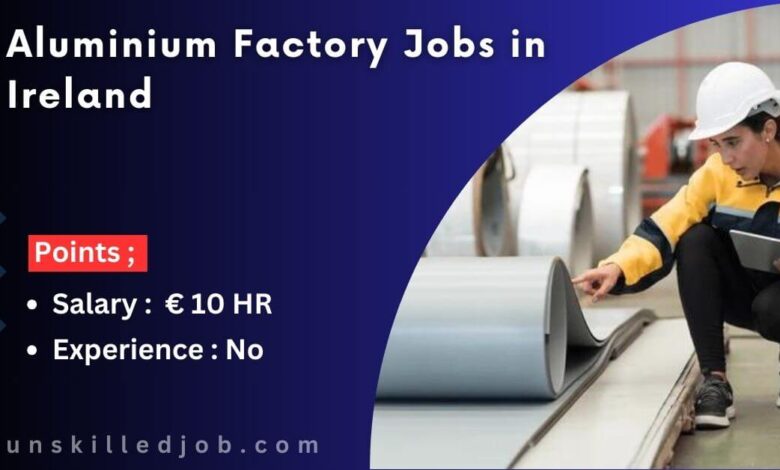Aluminium Factory Jobs in Ireland 2025 – Visa Sponsorship

Seamless Aluminium Ltd. is looking for a full-time manufacturing worker with great enthusiasm and energy to join its constantly expanding team. The selected individual will be a part of the production team, reporting directly to the production supervisor. They will be in charge of a wide spectrum of general operating activities supporting all aspects of manufacturing.
While it’s not mandatory, knowing engineering can be highly important individual who works hard and speaks rudimentary English is considered sufficient. y English. While the guidelines for applying for a job or a visa are somewhat rigorous and exact, the benefits are not. This will be specifically demonstrated in the next post. Let’s now discuss the specifics of Aluminum Factory Jobs in Ireland with Visa Sponsorship and an Employee Benefits Package.
Check Also: Food Store Cleaner Jobs in UK – Visa Sponsorship
Key Points:
- Job Country: Ireland
- Industry: Factory/ Manufacturing
- Job Type: Aluminum Factory Worker
- Minimum Experience Required: 1 year
- Education Required: Basic English
- Any Age Limit: No
- Visa: Sponsorship
- Relocation: Yes
- Accommodation: No
- Employment Term: Temporary and Full-Time
- Salary Hourly: €10.70 per month
Requirements:
- Although it is not necessary, it preferable is to have worked in the engineering area prior. Someone who is diligent and has a positive “can-do” attitude
- Excellent eye for quality; good in-person communication; speaks English fluently ·
- You have to be ready to work in Ireland.
Benefits of Aluminium Factory Jobs:
- Stability of Employment: Aluminum is an extensively utilized material across multiple sectors, such as packaging, automotive, construction, and aerospace. Consequently, aluminum factories frequently encounter a steady stream of customers seeking their products, thereby ensuring that their workforce is consistently employed.
- Diverse Career Paths: An assortment of professions and areas of expertise are represented in the workforce of aluminum factories, which comprises managers, production workers, machine operators, engineers, quality control assessors, and maintenance technicians. This diversity enables personnel to investigate various career trajectories and progress professionally within the field.
- Competitive Salaries: Positions in aluminum factories generally provide competitive remuneration, including overtime pay, shift differentials, and performance-based and productivity-based incentives.
- Training and Development: Numerous aluminum factories offer extensive training programs designed to equip newly hired personnel with the requisite expertise and competencies to execute their duties efficiently. Additionally, there may be opportunities for ongoing training to facilitate talent development and career progression.
- Benefits Packages: Benefit packages are frequently provided to employees of aluminum factories. These packages may consist of paid time off, health insurance, and retirement plans, among other advantages. These advantages enhance overall job satisfaction and contribute to financial security.
- Prospects for Professional Growth: Through the accumulation of experience and the exhibition of exemplary performance, staff members are eligible to progress to more elevated tiers within the factory’s organizational structure. Potential avenues for career progression may involve being promoted to supervisory or managerial positions, which entail greater duties and remuneration.
- Technological Advancements: The aluminum industry is in a constant state of evolution, with technological and process developments aiming to increase output, efficiency, and product quality. An aluminum factory offers its staff the chance to acquire knowledge and adjust to emerging technologies, thereby augmenting their repertoire of abilities and prospects for employment.
- Teamwork and Collaboration: Collaborative efforts and teamwork are frequently mandatory for employees in aluminum factories to accomplish production goals and uphold quality standards. This promotes harmonious collaboration and team spirit among staff members, thereby enhancing the overall atmosphere of the workplace.
- Support for Sustainable Practices: Numerous aluminum manufacturing facilities base their operations on resource efficiency and environmental sustainability. By contributing to sustainable practices and minimizing the environmental impact of aluminum production, employees can feel a sense of pride.
- The Potential for Global Opportunities: The aluminum industry is a multinational sector that offers employment prospects and collaborative ventures with organizations and companies from all over the globe. Employment in an aluminum factory may allow personnel to engage in international travel, contribute to worldwide supply chains, or work on initiatives of a global nature.
Who Can Apply for Aluminium Factory Jobs in Ireland?
Applications for aluminum manufacturing jobs in Ireland that will pay for their visas and provide a benefits package can be made by all Asian, African, and Latin American nations seeking employment in Ireland, the UK, or other European countries.
- Pakistan
- India
- Bangladesh
- Anguilla
- Antigua
- Barbuda
- Barbados
- Mexico
- Jamaica
- Dominica
- Sudan
- Grenada
- Trinidad
- Tobago
- Lucia
- Vincent
- The Grenadines
- Kitts-Nevis
- Montserrat
- Saudi Arabia
- UAE
How to Apply for Aluminium Factory Jobs in Ireland?
If you wish to enroll, please visit the link provided.
Frequently Asked Questions:
What is aluminum manufactured from?
Bauxite is used as the main raw material in the manufacture of aluminum. Tropical and sub-tropical areas such as Australia and the West Indies are home to this clay mineral. Bauxite is often mined from only a few meters below ground level. About 4-5 tons of bauxite are required for 1 tonne of aluminum.
What is the process for making aluminum?
The process of mining aluminum involves extracting bauxite ore, refining it to produce alumina, and then smelting the alumina to extract pure aluminum. Manufacturers can use the extracted aluminum to manufacture a wide range of products, from aircraft parts to cans.
How is aluminum prepared?
At an aluminum smelter, alumina is poured into special reduction cells with molten cryolite at 950 °C. Electric currents are then induced in the mixture at 400 kA or above; this current breaks the bond between the aluminum and oxygen atoms, resulting in liquid aluminum settling at the bottom of the reduction cell.




